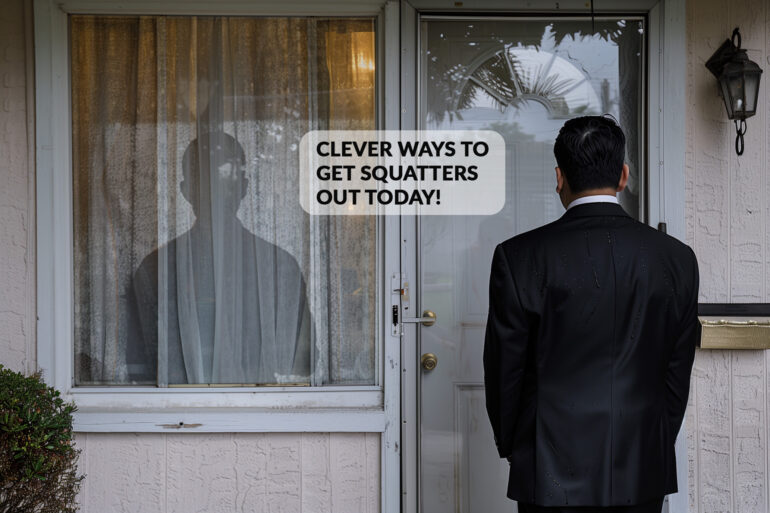Clever Ways to Get Squatters Off Your Property
Real estate investors incur several risks when they buy and manage properties, but few of those risks are more frustrating than having squatters on the premises. Even though these people are stealing landlords’ cash flow and properties by illegally staying put, many states have complex laws that turn what should be simple into a complex and lengthy process.
It can require a bit of creativity to quickly get a squatter off your property, and a handyman in Simi Valley, California, came up with an ingenious strategy to get squatters out of his mother’s rental property.
Flash Shelton explained to Fox Business that squatters do not have any rights until there’s a civil action. Rather than take legal action against the squatters, Shelton got a lease and became the squatter himself. He arrived at the property at 4 am and waited until later in the morning for the squatters to leave. He then sprang into action, entered the property, and set up cameras.
If the squatters re-entered the property, it would now be treated as an illegal entry equivalent of breaking into a home. It’s easier to prosecute on those grounds, and since the squatters didn’t have a lease, they walked away from the property.
If a squatter overextends its stay, an investor can write a lease for someone who fulfills Shelton’s role and becomes the ‘good’ squatter. This person can then use the loophole to get squatters off the premises.
Real estate investors who cannot turn their squatters into trespassers will have to endure a longer process that can get expensive in a hurry.
Check Your Local Laws First
Each state has different rules concerning squatters, and rules also vary for counties and cities. Squatters are more common in New York City since they get rights after 30 days of occupying a property that doesn’t belong to them.
It’s possible for a squatter to legally obtain your property if you don’t address them soon enough. In California, a squatter’s rights begin after five years of occupying the property without attempting to hide your occupancy from anyone. This is the shortest window.
Squatter’s rights for the state of New York only take place after ten years of occupancy. The squatter must also pay property taxes during his time. Texas has a 30-year window. A squatter in Florida must reside on the property for seven years and make efforts to improve it. After these conditions are met, the squatter can potentially legally obtain the property. Squatters attempting this legal conversion must pay property taxes. Investors should get rid of squatters as quickly as possible to avoid this scenario.
While investors want to remove squatters as quickly as possible, there are some limits to what you can do.
Getting a Squatter Off Your Property
If you want to remove a squatter, you must first file a police report. Acting as a squatter yourself in the way Shelton did turns the squatters you’re dealing with into trespassers if they re-enter your property.
Real estate investors who cannot turn their squatters into trespassers will have to endure a longer process that can get expensive in a hurry. A real estate attorney can help you find the most efficient route to removing a squatter from your property, but legal fees and proceedings can get expensive.
Some landlords use a “Cash for Keys” offer to persuade squatters to leave the premises. This strategy is essentially a bribe to get the squatter to vacate your property. While a Cash for Keys offer rewards the squatter, an eviction can be more expensive and take up more time. This approach allows an investor to minimize their losses and get a quality tenant into the property sooner.
If the squatter doesn’t budge, you will have to serve a notice of eviction and go through the process. You will have to demonstrate proof that the squatter illegally inhabited your property and that you gave them enough notice to leave the premises.
In some states, it is possible to sell a property while a squatter dwells in the unit. You will have to let potential buyers know about the squatter, which will result in a lower market price. While you will get less money from your property, you can give someone else the headache of getting rid of the squatter.
This approach can help you save money if the area is known for squatters or the legal proceedings look like they will be expensive. You can then reinvest the proceeds into other investments instead of having your money tied up into a property that isn’t generating cash flow.
Having friends in the community can help you address squatter issues early.
What to Avoid
While investors want to remove squatters as quickly as possible, there are some limits to what you can do. Landlords cannot turn off the utilities while a squatter resides in the property. You can turn off the utilities if your property is vacant. This strategy can discourage potential squatters but is illegal if a squatter already lives on your property.
Landlords should also avoid threatening squatters or removing their possessions. You can end up in a legal battle if you use any of these alternatives to remove a squatter from your property. Putting the squatter in a corner may tempt them to damage your property. Squatters can get away with damaging your property and stay on the premises as long as the property remains habitable, safe, and up to code. If the property doesn’t fulfill each of those parameters, you can get them out sooner.
However, you can put up public signs in your neighborhood to alert the community about the squatter. This strategy makes the squatter stick out like a sore thumb and can make their stay unpleasant.
Hiring a real estate attorney who specializes in residential properties and communicating with the police can speed up the process without making it worse. Contacting the authorities and letting your neighbors know what is going on can help you build evidence and a paper trail to enable a smoother eviction process.
Avoid Squatters in the First Place
Real estate investors have creative ways to get rid of squatters but may have to endure the eviction process instead. However, you can use several strategies to mitigate the risk of a squatter inhabiting your empty unit.
Keeping doors and windows always locked and befriending your neighbors can make a difference. Having friends in the community can help you address squatter issues early. You may receive a call from your neighbor alerting you about a squatter in a few days instead of learning about it after a few months.
Having a property management team stay on top of the property will offer an extra layer of security for your property. Investors can also check in with tenants and make sure there isn’t an illegal roommate whose name does not appear on the lease. These types of roommates can become squatters after the lease concludes and the legal tenants leave.








